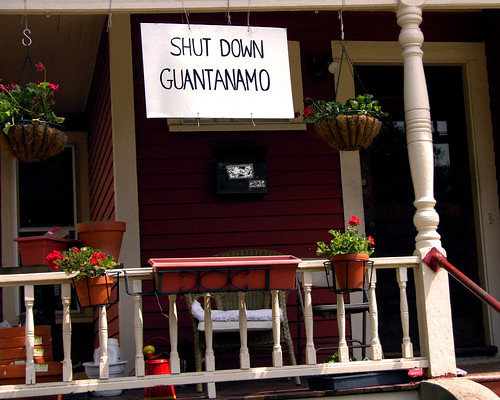 DSCN5412.jpg, originally uploaded by BenTG.
DSCN5412.jpg, originally uploaded by BenTG.And then shut down the American Psychological Association.
It turns out this little tangential ethical concern about medical participation in interrogations is at the very center of how the US has been carrying out its torture policies. It has begun to appear that the involvement of psychologists in interrogations is, in fact, the smoking gun that proves torture is an integral part of US policy in the so-called War on Terror.
Though the American Medical and American Psychiatric associations have both prohibited their members from participating in interrogations of detainees, the American Psychological Association has been taking a more permissive stance.
Last summer, the APA adopted new ethical principles drafted by a task force of 10 psychologists, who were selected by the organization's leadership. That controversial task-force report, which is now official APA policy, stated that psychologists participating in terror-related interrogations are fulfilling "a valuable and ethical role to assist in protecting our nation, other nations, and innocent civilians from harm."
Why is the APA's stance so different from that of the other two associations? Could it be because the APA's policy recommendations were made by military men?
Salon has learned that six of the 10 psychologists on the task force have close ties to the military. The names and backgrounds of the task force participants were not made public by the APA; Salon obtained them from congressional sources. Four of the psychologists who crafted the permissive policy were involved with the handling of detainees at Guantánamo Bay, Cuba, at Abu Ghraib prison in Iraq, or served with the military in Afghanistan -- all environments where serious cases of abuse have been documented. . . .
Task force member Col. Larry James was the chief psychologist for the intelligence group at Guantánamo in 2003. In 2004, James was at Abu Ghraib working as the director of the behavioral sciences group in the interrogation unit there. His biography said he was sent to Abu Ghraib "in response" to the abuse scandal. Requests to interview James were rebuffed; U.S. Army Medical Command spokeswoman Cynthia Vaughn referred Salon back to the APA.
And it gets even creepier.
Col. Morgan Banks spent four months during the winter of 2001 and 2002 "supporting combat operations" at Bagram Airfield in Afghanistan, where serious abuses have been reported. Banks told Jane Mayer of the New Yorker last summer he had also "consulted generally" on Guantánamo interrogations, but could not recall any specific cases. Banks' biography lists him as one of the founders and the senior psychologist at the Army's secretive Survival, Evasion, Resistance and Escape (SERE) program at Fort Bragg, N.C., where the military trains elite soldiers to resist torture in case of capture. The techniques used to harden those soldiers against torture -- sleep deprivation, isolation, sexual humiliation, bags on the head, long exercise -- have been used on detainees in Afghanistan, Guantánamo and Abu Ghraib. (Emphasis added.)
Remember Benjamin's Salon article from last month? There he reported that SERE "taught their methods to interrogators of the prisoners in Cuba." Now it seems that one of the torture teachers essentially wrote the book on torture techniques and then helped write the policy that would allow his students to be involved in interrogations.
Other military psychologists on the APA ethics task force include another SERE school veteran and two others involved directly in military operations.
If you listen to APA president Gerald Koocher, who hand-picked the ethics task force, or APA director of ethics, Stephen Behnke, you might feel slightly reassured to hear that "[p]sychologists take advisory or consultative roles in relation to interrogations to help ensure interrogations are safe, legal, ethical, and effective."
However, in at least one case, the psychologists on hand were actually calling the shots on torture.
[T]he presence of a psychologist did not prevent the interrogation of so-called 20th hijacker Mohammed al-Khatani at Guantánamo from turning brutal. Khatani was stripped naked, isolated, given intravenous fluids and forced to urinate on himself, and exercised to exhaustion during interrogations that lasted 18 to 20 hours a day for 48 of 54 days.
Part of the plan was to humiliate Khatani and submit him to extreme psychological stress. He became exhausted, disoriented and hopeless. He was called a homosexual, forced to wear a mask and dance, and leashed and made to perform dog tricks. Interrogators hung pictures of fitness models on his neck and had a female interrogator "invade his personal space," according to the unredacted interrogation log obtained by Salon.
To help break down Khatani's psyche, the interrogation team included a psychologist, Maj. John Leso, a member of the military's Behavioral Science Consultation Teams, called BSCTs. The teams are a newly minted tool in the "war on terror." They include psychologists who are supposed to help interrogators break down resistance and pry loose useful information. Former Guantánamo commander Maj. Gen. Geoffrey Miller called the teams "essential in developing interrogation strategies" in a September 2003 internal military report.
At various points during the questioning of Khatani, Leso's BSCT operators instructed interrogators to keep the prisoner awake, force him to stop staring at a wall, and advised on the effectiveness of techniques. "BSCT observed that detainee does not like it when the interrogator points out his nonverbal responses," reads an entry in the log from Dec. 29, 2002. (Emphasis added.)
If the BSCT operators were calling the shots just this once, that's one time too many.
There is reason to be concerned, however, that the Khatani interrogation was not an isolated incident. If BSCT operators are widely guiding interrogations, then Mark Benjamin may have just unraveled the torture scandal at the level of US policy decisions and how the APA stepped forward to enable them.







